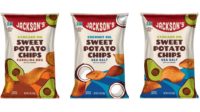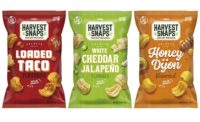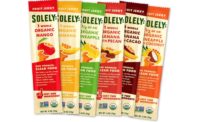In the space of 20 years, Bobo’s has grown from a mother-daughter rainy-day baking project to a national baked-snack brand with products on the shelves at Whole Foods, Target, and other big-name retailers. Recently, Snack Food & Wholesale Bakery connected with two leaders from the producer to learn about its history, philosophy toward giving back, and recent innovations:
- Beryl Stafford, president and founder
- TJ McIntyre, CEO
Jenni Spinner: Bobo’s got started 20 years ago as a family affair—could you please tell us a bit about those first days?
Beryl Stafford: Bobo’s began when my 14-year old daughter, Bobo, decided to bake some “gooey oat treats” in our kitchen on a rainy Sunday. She first made them with corn syrup, butter, and white sugar. I was a single mom at the time and was looking for a new career path. I decided to recreate these homemade oat treats with healthier ingredients, yet keeping the same delicious flavor.
After many trials in the kitchen and many hours with my artist friend creating a label, I came up with four Bobo’s flavors and a Saran-wrap package. I took the first Bobo’s to a local coffee shop and when they reordered a month later, and I made $14.00, I realized I might be onto something; a new business and a new career. I knew nothing about the food business, manufacturing or even sales. I soon saturated the Boulder local market with Bobo’s, and set my sights on distribution elsewhere around the country, attending every trade show I could and growing my bakery staff from one to 100 people in the first few years. Something I learned in those first few years is that to succeed one must be hungry, humble, and work the hardest in the room.
JS: Then, please tell us how it evolved from a mother-daughter baking and bonding experience.
BS: As demand for Bobo’s slowly grew, I decided to continue to do my own baking/manufacturing rather than find a co-manufacturer to make them. I liked being in control of each hand-baked bar, the bars were perfectly imperfect, and I wanted them to stay that way. Baked in a 3 oz. mini-loaf pan was the way I wanted them baked; not extruded with four exact corners per the co-man’s type of bar. So I just kept acquiring more ovens and hiring more people to fill demand that was steadily growing year after year. I financed the company with credit cards, second mortgage debt, and a small bank line of credit. I had no partners but hired a few consultants a few times. I managed it all myself for 12 years. That’s one way to learn every aspect of a business.
JS: Can you please talk about some of the things you believe helped Bobo’s succeed in growing from a small family operation to a brand with a broad national presence?
TJ McIntyre: Our success at Bobo's is always about the product itself. While we have growth our team, and scaled our operations and enhanced our brand, the product itself (our beloved Oat Bar) has remained true to its delicious, simplistic roots over two decades now. Our consumers adore us for our great social and environmental mission, and feel like our branding speaks to them as people, but it is really the yummy food we bake that keeps them coming back to us.
JS: What lessons did you learn about being a CPG operation along the way—is there anything you might do differently if you had to do it all again?
TM: We have worked hard on insuring the success of our core bars and bites for a long time now, and in so doing we made sure that our company has strength in its core... for the long term. There are many companies who are drawn too early to innovation, and when they embrace that path it becomes hard for them to focus on the primary products that they have marketed from the beginning. Bobo's has a strong business in the Nutrition Bar and Cereal Bar categories because we didn't get sidetracked by baking, cookies, granola, etc. along our way. Someday we'll look to these categories for expansion, but in the meantime we are going to maintain focus on our core.
JS: Bobo’s is fairly up front about its sustainability commitment—please tell us how the brand takes care of the planet, and how you communicate that to customers/retail partners.
TM: Our commitment to sustainability continues to develop in great ways. Our new bakery in Loveland, CO is 100% wind powered, and the waste stream coming out of the facility is 97% diverted from landfill. Our carbon footprint (largely from the gas-powered ovens we use to bake) is getting quantified, and soon we'll engage in carbon offset programs that are verified for accuracy in carbon sequestering. Lastly, we now exclusively sourcing oats that are Detox Project verified, meaning that they are 'free' of glyphosate reside due to a rigorous testing protocol they go through before we take possession of them in our bakery.
JS: Then, you’re also giving back to orgs like Habitat for Humanity, There With Care, PFLAG, and others—why is that important to your team?
TM: Direct service has been a hallmark of our company culture for many years, and the primary way that aspect of our mission comes to life is through our quarterly, all-company volunteering days. We talk about our mission being to 'Bring People Home, Feed Them Like Family', and by volunteering with non-profits that exhibit this mission in some similar fashion, we are able to life the words we put on our packaging. Food Banks, Habitat for Humanity, There With Care... these are all great organizations who provide crucial services to communities in need, and we are very fortunate to be able to work directly with them.
JS: Please tell us a bit about your newest product, PBJ's.
TM: Bobo's new PB&J's launched in April, and will sell in stores alongside our Bites (in the cereal bar category). This new product is intended to be a 'pocket sandwich' for families who are on-the-go and want a healthy snack to tide them over between meals. Based on early performance at Costco and on eatbobos.com, we have great reason to believe that PB&J's will be our #1 selling product, even before the end of 2023.





